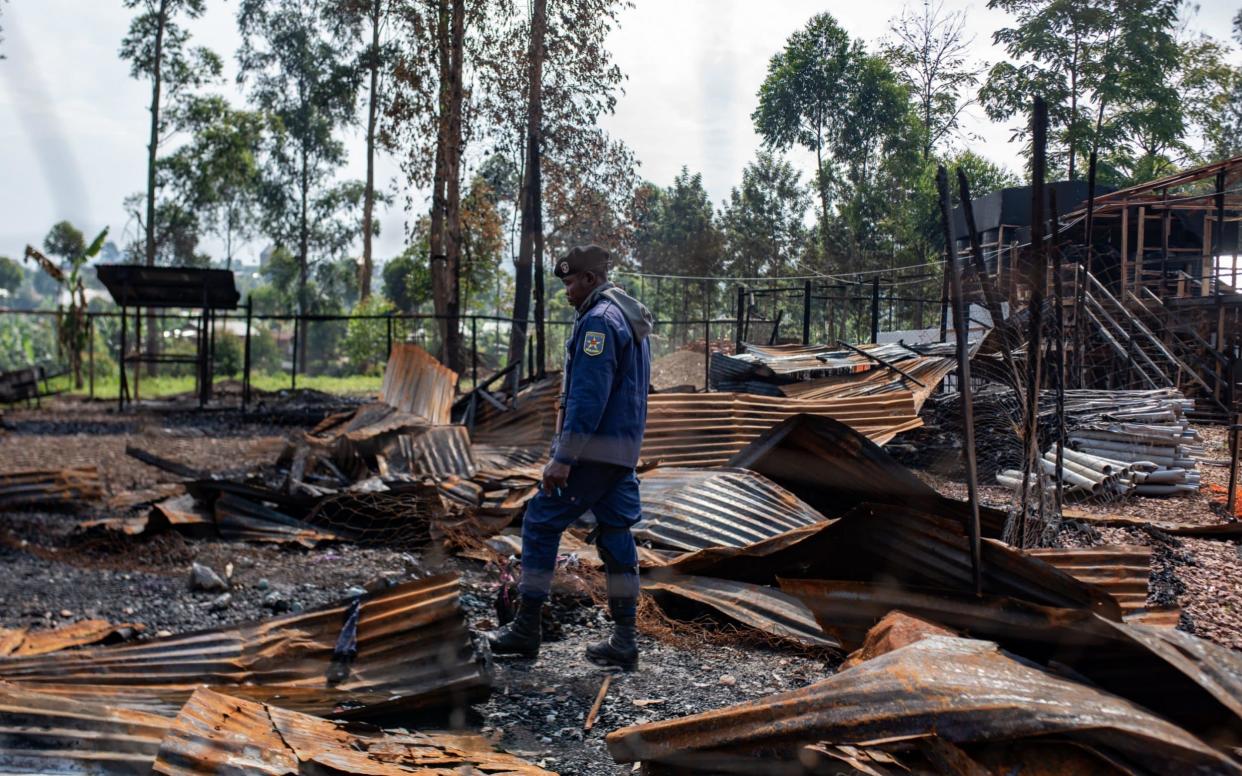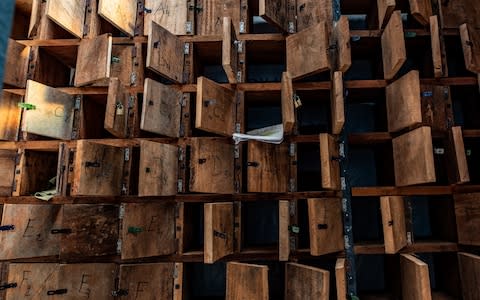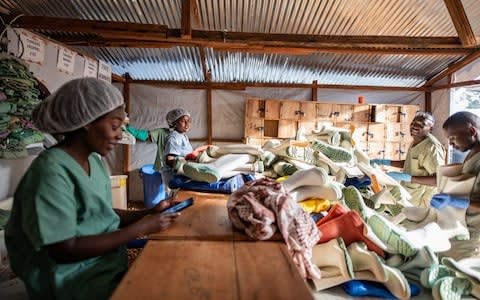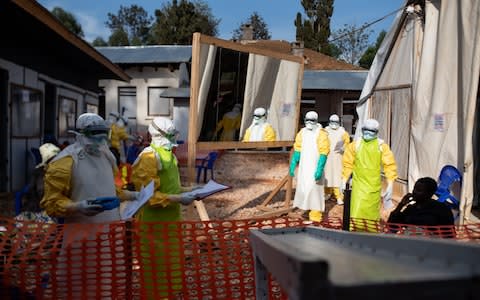Ebola treatment centres in DRC set ablaze as second-worst outbreak infects 1,000

Half slumped against the church wall as her son’s funeral plays out inside, Kavira Mwenge says in whisper, “I have so much anger in my heart. Who killed him?”
Justin, a 41-year-old police officer, was shot in the head by rebels as he stood guard outside an Ebola treatment unit in Butembo, eastern Congo, on March 7th. Nobody knows who was behind the attack.
Congo’s most volatile and dangerous province, which is home to more than a hundred rebel groups, is now hosting the second largest Ebola outbreak in history. On Monday, it was announced that 1,000 people have been infected with the virus since the start of August, and 621 have died.
Progress in stamping the disease out has been hampered by numerous cases of violence. Three recent attacks on treatment centres have been blamed on “Mai Mai rebels,” which means little as many groups that prowl the area take this name.
One centre, which was co-run by Médecins Sans Frontières (MSF), was burned to the ground on February 24. Its charred remains have since been abandoned. Just three days later, rebels charged into the second centre where MSF were working, waving machetes and guns.

They ordered the sick to get up out of bed and leave. Twelve confirmed Ebola patients clambered out of their care units and fled, along with frightened health workers.
One woman, Kavu Mate, was hooked up to a drip and too weak to move. “I heard someone shouting – bring the matches,” she says, “And then I felt the heat of the fire from my bed.” Luckily, the tent she was staying in was spared, and one hour later nurses crept back in to rescue her and take her to another care centre.
MSF has since pulled out of Butembo, deeming operations there too risky. “In light of these two violent incidents, we have no choice but to suspend our activities until further notice,” said Hugues Robert, MSF emergency desk manager. “It is very painful to have to leave behind patients, their families and other members of the community at such a critical time in the Ebola response.”
Ebola causes a painful death by internal hemorrhaging and is spread through bodily fluids. Corpses can be contagious, so safe burials that prevent family members from handling or washing the body are paramount to controlling the spread, as is tracing the contacts of sufferers and getting them vaccinated. This is difficult in a region where some villages are controlled by rebel groups.
“There is today a health zone called Vuhovi,” says Dr. William Perea, Incident Manager for WHO in Butembo, “We are having huge troubles to access the chains of transmission down there.”
Tracking the infection is difficult. According to a report from MSF, 43 per cent of patients that recently caught Ebola did not have any known links to other cases.

However, a vaccine developed after an Ebola outbreak in West Africa that killed more than 11,000 people between 2013-16 has prevented the virus from spreading as rampantly as it might have done.
“If it weren’t for the vaccine, the disease could have killed thousands by now,” says Congo’s Minister of Health, Dr Oly Ilunga. Together with the World Health Organization (WHO), the ministry has managed to inoculate more than 85,000 people.
While premeditated attacks on treatment centres have been attributed to armed groups, there have also been a series of spontaneous assaults on health workers. These stem from a deep distrust towards those in the response, and a lack of understanding of what Ebola is.
“They hit me with wooden sticks and they broke the car,” says Gilene Barati, field coordinator for WHO, tugging at her shirt to reveal a long cut on the back of her neck. Along with a team of four others she had travelled to a village to trace the contacts of an Ebola patient. Their car was ambushed as they headed home.
Other reports, such as vehicles being pelted with stones and members of the burial team being attacked with machetes, drip in each week. In one particularly remote and hostile village, a male nurse was strangled to death in front of his wife.
After living through decades of violence and hardship, it is hardly surprising that the people of Butembo do not trust the authorities. Many of those living in the region have been subject to gang rapes, massacres and abductions for more than two decades.

The armed forces are widely believed to be in cahoots with rebel groups. They rape, extort and kill alongside them. When health teams turn up in villages with police escorts to protect them, people are – unsurprisingly – wary.
“What’s the correlation between an illness and the police?” says mechanic Alexis Kassererka, hanging around on the roadside with a group of friends. “For one ill person, ten cars come with the police and people in masks.”
His friend suggests that the government bought the disease to the town to kill those who live there. His theory seems far-fetched until he adds that his people have been massacred for years and if those in charge wanted to stop the violence, they could. “They want to kill us, but up until now we don’t know why,” he says, shrugging.
A young woman called Grace Mupepe, bouncing her newborn baby on her knee outside her house, offers up another theory. “Ebola is a game bought by white people to make money from us,” she says. In a country where two thirds of the population survive on less than $2 (£1.50) a day, the fleets of shiny new four by fours that have been tearing down Butembo’s dusty roads since the start of the outbreak, spark envy.

Others believe that Ebola was imported to the region to prevent them from voting in Congo’s presidential election in December. The towns of Beni and Butembo – both opposition strongholds – were banned from casting their ballots due to the outbreak.
On polling day, determined residents set up their own voting booths (complete with disease prevention measures such as watered down chlorine for hand-washing) and hundreds of people queued up to exercise their democratic right. Their votes did not count.
To try and reduce hostility, health teams recognise they need to work more closely with local communities, and teach them to tell their neighbours on what Ebola is and how to stop it from spreading. “Community engagement,” have become buzzwords in United Nations meeting rooms from Butembo to Geneva, though progress in getting people to really understand Ebola has been slow.
The communities are the “Ones paying the consequences for all this,” says Dr. Perea, “We need to really be able to join hands and work together.”
Protect yourself and your family by learning more about Global Health Security

 Yahoo News
Yahoo News 
